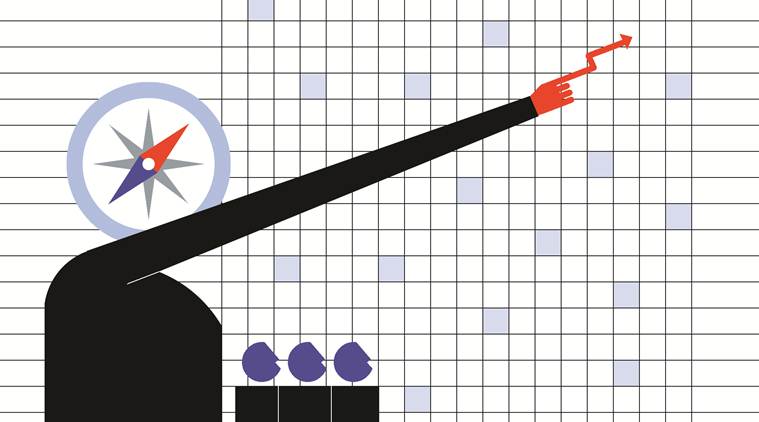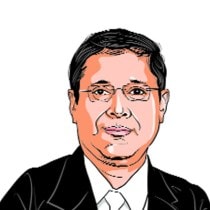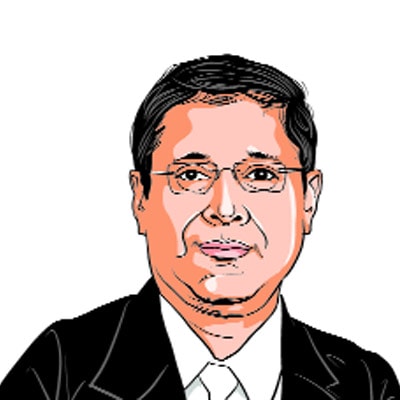Parting reflections of a CEA
The Office of the Chief Economic Adviser is a unique public institution — not just another cog, albeit technocratic, in the vast machinery of the government of the day.

CEAs, in addition to specific expertise, must possess a certain attitude and disposition of providing honest, disinterested advice and speaking truth to power in deliberations within government. (Illustration: CR Sasikumar)
Tomorrow is my last day in office as the Chief Economic Adviser (CEA) to the Government of India, a job of enormous responsibility, opportunity, excitement and of course, prestige. I must not indulge in reflection that risks turning sentimental. I should probably follow T S Eliot in Little Gidding: “I am not eager to rehearse/ My thoughts and theory which you have forgotten./ These things have served their purpose: let them be.”
But I am not detached enough to do so. And the truth is this is too poignant and fraught a moment — leaving the best job I have ever had and probably ever will — to not mark it with some reflection. Not as a retrospective, self-indulgent litany of my own achievements and shortcomings, but on the role of the CEA more generally, with prospective lessons for those who may come to occupy it in future.
Every Indian economist who has even a shred of policy pretension aspires to this job. Some (many?) covet it ferociously. I was lucky enough for my dream to be fulfilled, an interloper appended to a lineage of illustriousness: from I G Patel, V K Ramaswami, Manmohan Singh, Ashok Mitra, Bimal Jalan, Shankar Acharya in the early years, to Kaushik Basu and Raghuram Rajan more recently.
When I look at the board in my office room in North Block — squeezed between portraits of Tagore, Gandhi, and Nehru — listing the names of my predecessors, I am reminded of the Patek Philippe line “You never actually own a Patek Philippe. You merely look after it for the next generation.” Similarly, as the CEA, I came to realise that I was merely the custodian of a sacred tradition and responsible for upholding it honourably (and, at the same time, petrified of debasing it).
The research of many brilliant scholars is increasingly highlighting the critical role of state capacity and public institutions in fostering long-run political and economic development. I firmly believe and would insist that the Office of CEA is one such public institution — along with the many others (RBI, EC, SEBI, TRAI etc.) that are traditionally accepted as such.
And it is a unique institution. There are few vantage points in government that have such a broad perspective on the economy, and even fewer that combine proximity to decision-making (including but not restricted to the budget process) with high-frequency analysis and inputs, and yet with enough distance to require a more academic/policy perspective.
One way to highlight the distinctiveness of the Office of CEA is to see that there are no comparable institutions elsewhere. It would be as if, in the US, the jobs of Chairman of the Council of Economic Advisers (advisory in function) and of the Chief Economist of the US Government (a non-existent post) were combined and located in the US Treasury.
A few consequences follow from this view for any CEA’s general attributes, specific expertise, and disposition.
First, the CEA has and must have multiple roles: Providing input into policy; generating new ideas for discussion and eventual policy adoption; being a platform for, and elevating, the public discourse on economics and economic policy-making, especially in this post-truth era; communicating the government’s policies and other ideas to a broader public; mentoring junior colleagues across government; and building capacity within government, especially in the Indian Economic Service. And, in principle, there is no reason why any of the above should be restricted to the central government because during my tenure there was serious demand from chief ministers and finance ministers of several states for these services.
That means the incumbent must have a capability commensurate with these roles. Ideally, of course, these capabilities should come close to meeting Keynes’ job description: “The master-economist must possess a rare combination of gifts. He must be mathematician, historian, statesman, philosopher — in some degree. He must understand symbols and speak in words. He must contemplate the particular in terms of the general and touch abstract and concrete in the same flight of thought. He must study the present in the light of the past for the purposes of the future. No part of man’s nature or his institutions must lie entirely outside his regard. He must be purposeful and disinterested in a simultaneous mood; as aloof and incorruptible as an artist, yet sometimes as near to earth as a politician.”
To this impossibly demanding list of attributes, I would add two more from personal experience. Policy advisers must understand the psychology of the key decision-makers in government, not least because persuasion involves stoking vanities, avoiding ruffling egos, exploiting idiosyncracies, discerning biases and prejudices, and pressing the right buttons at the right moments. (Keynes himself demonstrated in his brilliant Economic Consequences of the Peace an uncanny ability to read the minds of the three key protagonists and their role in shaping the Treaty of Versailles). Hence, psychologising and schmoosing — deployed to making the case that good economics is good politics — are key parts of the CEA’s job description.
Assembling teams is another key task for the CEAs. Whether writing comprehensive and ambitious Economic Surveys, working on the numerous policy issues, preparing high-frequency briefs, or understanding data better, the CEA has to form a core team built around the IES staff in the Ministry of Finance and then add to it, as appropriate, “outsiders” (such as bright young researchers from universities) and colleagues in other parts of government. The broader and more ambitious the remit of a CEA, the greater the need for team-building.
In addition to broad attributes, since the CEA is supposed to be an expert, she/he must also possess specific expertise grounded in familiarity with all the relevant academic and policy research. Above all, expertise in macro-economics to discharge the bread-and-butter responsibilities of working in the Ministry of Finance, which in this globalised era necessarily means expertise in international macro-economics. In addition, that expertise should extend to macro-development economics (for example, trade, tax, fiscal, and financial policies) in order to handle the range of issues that the Ministry of Finance is inevitably involved in and that India will necessarily confront as a still-developing country.
International macroeconomics in particular is hard. It is inherently general equilibrium in nature, involving at least five or six markets and their complex interactions: Goods (tradable and non-tradable), domestic money and domestic bonds, and their foreign counterparts. Proficiency in it requires academic knowledge, technical training and practice; it is not something that can be acquired quickly on the fly. A corollary is that being a good economist or financial analyst will not be qualification enough for being a CEA.
A third consequence of being a public institution is that the Office of CEA must engender public trust. That requires reconciling the privilege of helping the government and being its spokesman with discharging certain fiduciary responsibilities to the country at large. In other words, the incumbent must strongly support the government without spinning on behalf of it, must seek to combine fealty to the government with fidelity to the larger good, and must focus on immediate policy agendas without losing sight of longer term consequences. Put in Mahabharata’s terms, a CEA must practise both loyalty and dharma, aspire to be both Karna and Arjuna.
In turn, that means that CEAs, in addition to specific expertise, must possess a certain attitude and disposition of providing honest, disinterested advice and speaking truth to power in deliberations within government. They must advance good ideas and flush out bad ones in their capacity as intellectual sanitation workers (as the Nobel laureate Robert Solow put it). The fact that the CEA is part outsider — with outside options — is critically important to being such a counsellor. (Whether, to what extent and when, such truth-speaking — never on matters beyond economics — should spill into the public domain are much more controversial questions, admitting of genuinely divergent perspectives).
I have listed the ideal CEA’s attributes. But let me hasten to add that that does not mean that I either possessed them or met the standards of an effective CEA. Indeed, I have probably fallen severely short in many respects which future CEAs could learn from.
A final thought. This idea of the CEA as a unique public institution — rather than as just another cog, albeit technocratic, in the vast machinery of the government of the day — must be fully embraced by governments and finance ministers. I am grateful that this government and, especially Minister Arun Jaitley, did so enthusiastically.
So, as the lights go out, the exit door beckons, and the succession gets underway, it is worth reflecting on this unique Indian institution of the Chief Economic Adviser. It seems worthy of preservation and nurturing.
The writer is the soon-to-be former Chief Economic Adviser to the Government of India
For all the latest Opinion News, download Indian Express App
More From Arvind Subramanian
- GST, a buoyant forceAggregate revenues have done well, despite headwinds, especially for less developed, consuming states..
- Economic Survey 2018 — Thrust areas: Economic convergence, gender inequality, climate changeThe Survey strives to combine rigor with readability, a challenge that increases in the same proportion as attention spans shrink (from absorbing op-eds to scrolling…
- Putting electricity in GSTIt must be brought within the ambit of the new tax regime. This will reduce costs, eliminate cross-subsidisation and restore the neutrality of incentives which…








































No hay comentarios:
Publicar un comentario